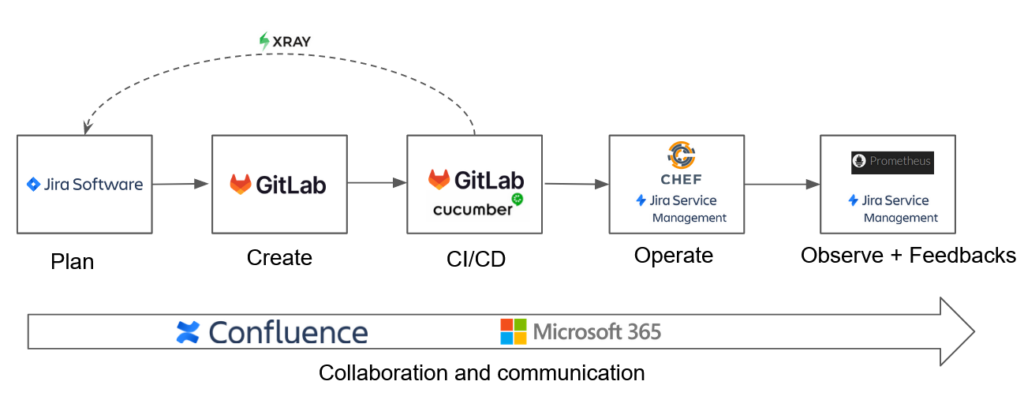Atlassian, GitLab and Microsoft are the 3 main players on the market, if not the only ones, capable of providing tools for the entire DevOps chain. Our recent study on the subject illustrates this.
3 publishers to keep in mind for the DevOps tool chain market?

With the acquisition of GitHub, Azure DevOps and the extended Microsoft365 suite (including power platform and power BI), the software giant is well equipped to support the DevOps chain.
For its part, Atlassian also has some serious assets, starting with Jira, which provides a very solid foundation for the DevOps chain. Bitbucket provides developers with more practical tools for creation and deployment.
Finally, GitLab is recognised as the main market leader with a unique but comprehensive suite. From project management to monitoring.
In reality, and this is what our study underlined, it is difficult to rank the most successful DevOps software vendor, and it makes no sense to do so. Above all, despite the great capabilities of these 3 specialist vendors, they all have shortcomings that mean that the entire chain will never be sufficiently effective
The DevOps chain, an open chain.
Beyond the fact that you don’t want to put all your eggs in one basket, there are other reasons not to leave your DevOps chain to a single vendor.
Firstly, the DevOps ecosystem is huge:

Each team and each developer has its own habits and performance with one tool rather than another, so why not continue to use them as much as possible while rationalising things?
Microsoft’s GitHub and Microsoft365 are powerful and indisputable tools in their specialities. But when it comes to project management… Neither Project nor Azure Boards can match Jira’s efficiency. And yet it’s a fundamental building block for DevOps.
Similarly, at GitLab, project management is equipped, but organisations use Jira and it’s the tool that’s best adapted to their context.
However, Atlassian won’t be able to tool the whole chain either. So why not take the best for each stage?
With this in mind, the DevOps players know how to communicate about the connectors they offer, often to competing offerings. Atlassian, for example, has gone so far as to package an ‘Open DevOps’ offering that allows you to use any tool on the market for each stage, with the only prerequisite and central tool being Jira Software. With its Marketplace, Jira has the capacity to connect with a large number of tools in the DevOps chain, and the Jira tool itself provides a solid link in the cycle: Jira Service Management, which is useful at the end of the cycle, is closely linked to Jira Software, which is essential for planning and monitoring testing.

GitLab is still the most effective tool for creation and continuous integration (GitHub is another, but does not offer continuous integration), then Jira Service Management will be a very effective base at the end of the cycle in combination with specialised tools for operations and monitoring. As far as collaboration is concerned, there are few tools that can provide knowledge management like Confluence, and the Microsoft suite has proved its worth for day-to-day communication.
Of course, this is a marketing offer based on Jira’s dominance of the market and serves to illustrate the use of the connectors offered by Atlassian products. The principle can then be applied to each publisher identified as the market leader. The example above illustrates a choice of tools that are among the most advanced on the market, but the objective is above all for each organisation and each team to choose the tool chain that best suits them. For this, the market is mature.


